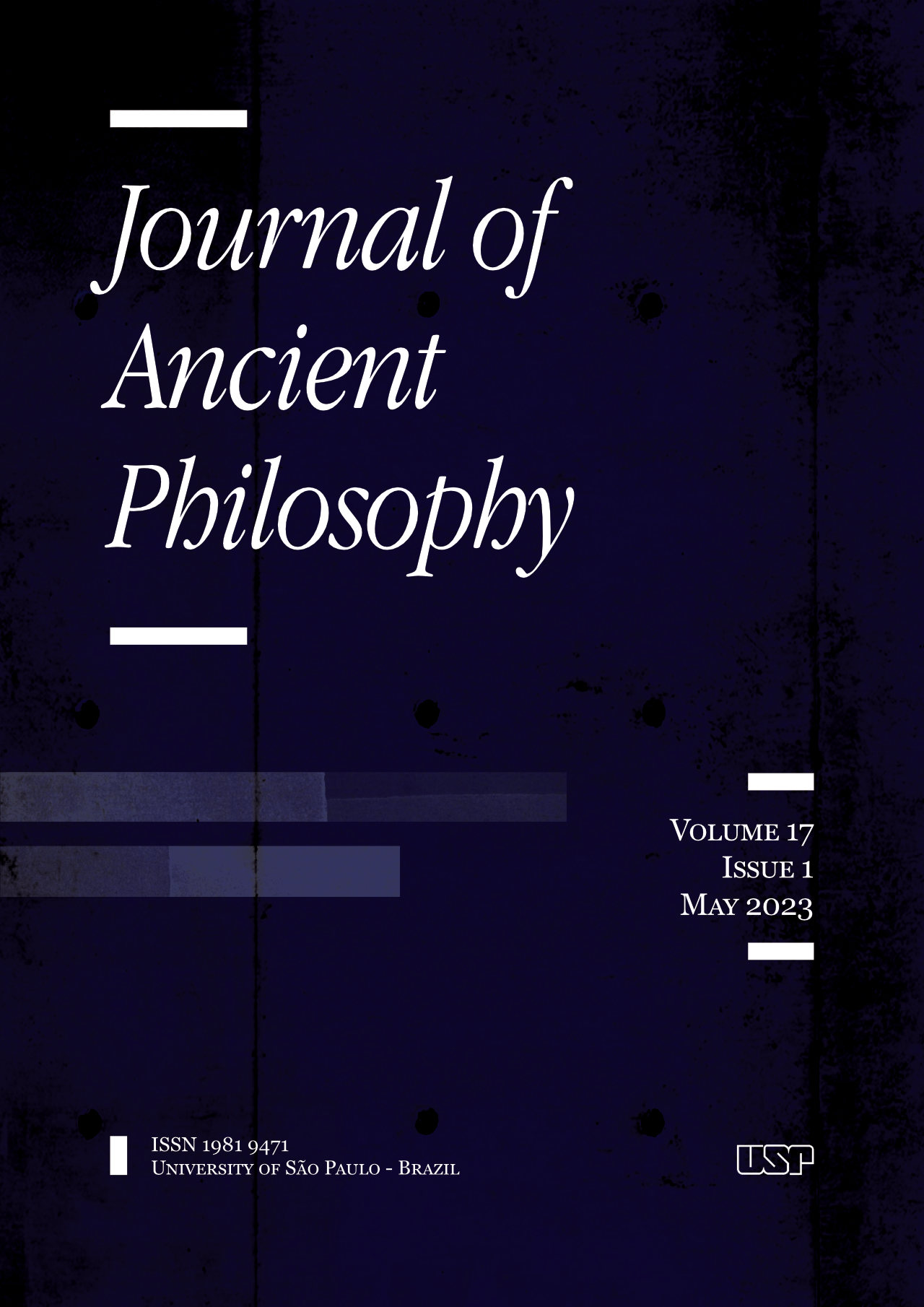Percepción Moral y Conocimiento Práctico en el Estoicismo
DOI:
https://doi.org/10.11606/issn.1981-9471.v17i1p121-138Keywords:
Estoicos, ética estoica, representaciones mentales, filosofia de la accionAbstract
In a paper published in 1998, Ricardo Salles argues that the Stoic theory of action cannot account for practical knowledge, i.e., knowledge about what action is appropriate to be carried out in certain circumstances. The aim of this paper is to propose a solution to this problem. For this aim, I argue that the Stoics developed a perceptual theory of moral knowledge. According to this theory, the moral properties instantiated in objects, people, and actions are known through perception. After explaining this theory, I argue that it allows us to show that the Stoics deemed perception as a source of practical knowledge.
Downloads
References
Annas, J. (1992). Hellenistic Philosophy of Mind. University of California Press.
Blackson, T. (2017). Impulsive Impressions. Rhizomata 5 (1), pp. 91-112. DOI: 10.1515/rhiz-2017-0005
Brennan, T. (2003). Stoic Moral Psychology. En B. Inwood (ed.), The Cambridge Companion to the Stoics. CUP, pp. 257-94.
Brennan, T_. (2005). The Stoic Life: Emotions, Duties, and Fate. OUP.
Boeri, M. D. y Salles, R. (2014). Los filósofos estoicos. Ontología, lógica, física y ética. Ediciones Universidad Alberto Hurtado. [BS]
Bonhöffer, A. (1890). Epictet und die Stoa. Untersuchungen zur stoischen Philosophie. Ferdinand Enke.
Caston, V. (en prensa). The Stoics on Mental Representation. En J. Klein y N. Powers (eds.), The Oxford Handbook in Hellenistic Philosophy. OUP.
Fine, G. (2014). The Possibility of Inquiry: Meno’s Paradox from Socrates to Sextus. OUP.
Frede, M. (1986). The Stoic Doctrine of the Affections of the Soul. En: M. Schofield y G. Striker (eds.), The Norms of Nature. CUP, pp. 93-110.
Gómez Espíndola, L. L. (2016). Responsabilidad moral y destino en el estoicismo temprano. UNAM, Instituto de Investigaciones Filosóficas.
Harven de, V. (2019). Rational Impressions and the Stoic Philosophy of Mind. En J. E. Sisko (ed.), Philosophy of Mind in Antiquity. The History of the Philosophy of Mind, vol. 1. Routledge, pp. 219-35.
Inwood, B. (1985). Ethics and Human Action in Early Stoicism. OUP.
Klein, J. (2021). Desire and Impulse in Epictetus and the Older Stoics. Archiv für Geschichte der Philosophie 103 (2), pp. 221-51. DOI: 10.1515/agph-2017-0113
Mayer, S. S. (2018). Passion, Impulse, and Action in Stoicism. Rhizomata 6 (1), pp. 109-34. DOI: 10.1515/rhiz-2018-0006
Pineda, C. (2023). Misprinted Representations in Stoicism. Apeiron 56 (2), pp. 325-51. DOI: 10.1515/apeiron-2022-0036
Ramos-Umaña, L. (2022). Proaíresis en Epicteto. Nova Tellus 40 (2), pp. 53-81. DOI: 10.19130/iifl.nt.2022.40.2.0021X53
Salles, R. (1998). El problema del conocimiento practico en la teoría estoica de la acción. Tópicos, 14, 105-33. DOI: 10.21555/top.v14i1.413
Schwab, W. y Shogry, S. (2021). Epicureans and Stoics on the Rationality of Perception. Philosophy and Phenomenological Research 00: 1-26. DOI: 10.1111/phpr.12838
Scott, D. (1988). Innatism and the Stoa. Proceedings of the Cambridge Philological Society 34, pp. 123-53. DOI: 10.1017/S0068673500005095
Sorabji, R. (2000): Emotion and Peace of Mind: From Stoic Agitation to Christian Temptation. OUP.
Shogry, S. (2019). What do our impressions say? The Stoic theory of perceptual content and belief formation. Apeiron 52, pp. 29-63. DOI: 10.1515/apeiron-2018-0001
Stevens, J. (2000). Preliminary Impulse in Stoic Moral Psychology. Ancient Philosophy 20, pp. 139-68.
Stojanovic, P. (2014). Epictetus and Moral Apprehensive Impressions in Stoicism. En D. R. Gordon y D. B. Suits (eds.), Epictetus: His Continuing Influence and Contemporary Relevance. RIT Press, pp. 165-95.
Striker, G. (1980). Skeptical Strategies. En M. Schofield, M. Burnyeat y J. Barnes (eds.), Doubt and Dogmatism: Studies in Hellenistic Epistemology. OUP, pp. 54-83.
Veres, M. y Macheck D. (en prensa). Expert impressions in Stoicism. Archiv für Geschichte der Philosophie. DOI: 10.1515/agph-2021-0038
Werner, P. J. (2017). Moral Perception without (Prior) Moral Knowledge. Journal of Moral Philosophy 15 (2), pp. 164-81. DOI 10.1163/17455243-46810075
Downloads
Published
Issue
Section
License
Copyright (c) 2023 Christian Pineda

This work is licensed under a Creative Commons Attribution-NonCommercial 4.0 International License.
Copyright
Authors who publish with this journal agree to the following terms:
- Authors retain copyright and grant the journal right of first publication with the work simultaneously licensed under a Creative Commons Attribution License (CC By 4.0) that allows others to share the work with an acknowledgement of the work's authorship and initial publication in this journal.
- Authors are able to enter into separate, additional contractual arrangements for the non-exclusive distribution of the journal's published version of the work (e.g., post it to an institutional repository or publish it in a book), with an acknowledgement of its initial publication in this journal.
- Authors are permitted and encouraged to post their work online (e.g., in institutional repositories or on their website) prior to and during the submission process, as it can lead to productive exchanges, as well as earlier and greater citation of published work (See The Effect of Open Access).


